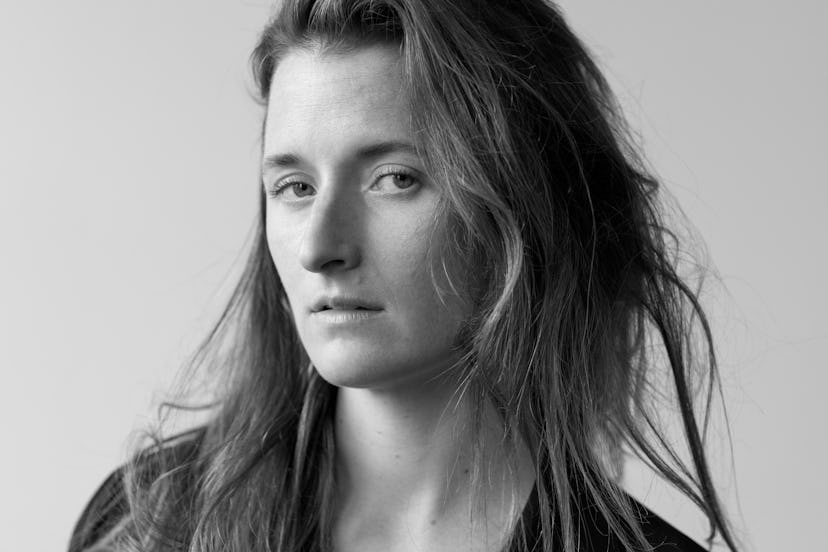Grace Gummer has found a way to be intentional about who gets to point a lens at her. The actress—whose parents are Meryl Streep and the sculptor Don Gummer—has grown up a few steps’ distance from the world’s brightest spotlights and grandest stages. But somehow, she’s spent a lifetime building a low key existence—minor tabloid presence, no social media, relative normalcy.
“I don’t know that there ever was a decision to be private,” Gummer tells me over Zoom from her home in New York City. “I just tend to be this way.” The actress, who has grounded herself with a shield of privacy, feels the world’s attention doesn’t make her acting any better—and that, ultimately, is the goal upon which she’s focused. “I just want to be mutable and shiftable and known for my actual work, rather than, for example, where I was seen or what I wore on the red carpet.”
Gummer is surrounded by artists. In addition to her mother and father, her sisters, Mamie Gummer and Louisa Jacobson, are actors, and her brother, Henry Wolfe Gummer is a musician. Her husband, Mark Ronson, whom she wedded in 2021, is a decorated producer and DJ (the two are now expecting their first child together). After spending years in L.A., she’s now back in New York—where she's not only making art, she’s steeped in it, too. “Mark’s writing a book, so he’s reading a lot of memoirs, and he’s passing me his favorites,” she tells me at one moment. Then: “I’m feeling really inspired by one of my best and dearest friends, Betty Gilpin, who wrote a collection of essays that makes me reflect on being a woman, being a daughter, being an actor.” And she just saw Leopoldstat on Broadway. “I don’t even know how to put it into words. Have you seen it?” It’s clear that Gummer belongs to a world of stories. “I don’t know how to be anything else but this,” she adds.
In her latest project, Gummer stars in a remake of the vampire classic Let the Right One In—the original was a Swedish horror film from 2004; followed by a second, American adaptation in 2008 called Let Me In. In the 2022 Showtime series, which premiered on October 9, Gummer's character, Claire, is a researcher in New York who gets pulled back into her estranged family’s life—only to find out her brother is a vampire and her father is running an underground research and blood sourcing operation of his own. While auditioning for the role, the show’s executive producer, Andrew Hinderaker, gave Gummer just the kind of direction that locked her into the role.
“I don’t love horror. I don’t seek [horror films] out," Gummer says. "But this, to me, was not a typical horror show at all. What drew me to this character and the show had so much to do with what Andrew pitched to me and his vision of the show—which was really a larger metaphor for battling addiction, what it means to love someone battling addiction, and what you will put yourself through and go through when you are close to someone who has this problem."
Gummer experienced a sense of home in embodying Claire, whose conflicts felt profoundly human, despite the vampiric, otherworldly setting of the series. She enjoys the fact that the audience must question whether Claire is a villain—even more so because Claire herself can barely figure it out. Gummer took seriously the task of constructing the version of Claire that viewers meet initially, and then reconstructing the version she becomes after witnessing the horror of her brother’s life.
Throughout our interview, Gummer brings a delicacy and thoughtfulness to her answers—there are often long pauses after I ask a question while she chews on an idea; she seems to enjoy the process of putting together words that express her meaning precisely. But one clear through line during the conversation was Gummer not being able to stop gushing over her craft. She’s an artist with an affinity for the process, and her carefulness is replaced with giddiness as she describes what it felt like playing a woman who faces a major moral crisis and can’t afford to make decisions she’s proud of.
“You don’t really get to do it in real life,” she says about why she felt so excited to flirt with a sort of immorality. “You don’t get to go into the darkest parts of your mind and express those feelings that you may have subconsciously or hidden away. Even though it can be really upsetting and disturbing for me to go to those places in my mind, there’s definitely a beautiful release, because you’re not really allowed to.”
She describes the process of diving into your own shadow for a character as “pretty good therapy,” while also getting very honest about the toll it takes on the psyche. (“I’d come home from work, and my husband would be like, ‘Are you mad at me?’ No, I just had to imagine the worst scenarios that you can ever imagine over and over and over again!”) Actors’s processes have become a fun quip—from controversy over Jeremy Strong’s now overly meme-ified (but clearly effective) on-set behavior to Lady Gaga’s entire House of Gucci press cycle—but something almost all actors insist upon is ensuring the mind and body can’t tell a character’s conflicts from one’s own.
“Putting myself into that dark place is something I have to warm up to do and warm down to get rid of,” Gummer says. “It can definitely stay with you in little ways throughout the day when you don’t realize. You can surprise yourself with how it does actually live in you. That can be frightening sometimes, too. But you have to convince yourself that it’s very real to you, that it’s deeply cellular and within your soul.”
